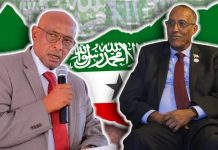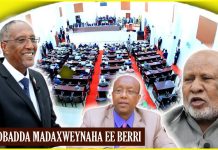With 189 member countries, staff from more than 170 countries, and offices in over 130 locations, the World Bank Group is a unique global partnership: five institutions working for sustainable solutions that reduce poverty and build shared prosperity in developing countries.
The World Bank Group works in every major area of development. We provide a wide array of financial products and technical assistance, and we help countries share and apply innovative knowledge and solutions to the challenges they face.
We face big challenges to help the world’s poorest people and ensure that everyone sees benefits from economic growth. Data and research help us understand these challenges and set priorities, share knowledge of what works, and measure progress.
MOGADISHU, September 28, 2021 — Somalia has set a bold target of vaccinating 70 percent of its population (about 11 million people) with the support of a recently approved International Development Association grant of $45 million for the Somalia COVID-19 Emergency Vaccination Project.
The project aims to support the Federal Government of Somalia (FGS) to acquire and deploy COVID-19 vaccines, and to strengthen its pandemic preparedness, response, and health system capacity as well as its national immunization capacity. The project is also expected to increase financing for the country’s vaccination campaign in partnership the World Health Organization (WHO), the United Nations Children’s Fund (UNICEF), and other partners.
“The Somalia COVID-19 Emergency Vaccination Project comes at a critical point in Somalia’s pandemic response given the latest surge in cases and the kickoff of the vaccination program,” said World Bank Country Manager, Kristina Svensson. “The project will play a critical role in enabling affordable and equitable access to vaccines for Somalia.”
The global COVID-19 pandemic runs the risk of undermining the recent modest progress on economic and political reforms. While Somalia has reported a cumulative total of about 22,000 cases and roughly 1,200 deaths as of October 2021, these figures likely underestimate the actual scope and magnitude of the pandemic.
Somalia’s National Deployment and Vaccination Plan (NDVP) for COVID-19 Vaccines, using both the COVAX facility and the African Vaccine Acquisition Trust (AVAT) as well as donations from countries with surplus stockpiles, will take a phased approach to both the vaccine roll out and the target groups across all Federal Member States. With almost 500,000 doses already delivered earlier in the year and administered, this project plans for an additional over 10 million doses to be made available to Somalia.
We are leveraging the power of local and international partnerships, working with all levels of government, WHO and UNICEF to deliver improved health outcomes for the people of Somalia,” said World Bank Technical Task Team Leader, Bernard Olayo. “Collaborating closely with the Federal Government and the Federal Member States will help bring the vaccine to every household in Somalia to protect them from the virus.”
The project incorporates early lessons learned from the COVID-19 health response in Somalia, and lessons from other FCV countries. In addition to vaccine procurement, it will also support social mobilization efforts to educate health workers and community members about COVID-19, including the benefits of the vaccination program to address concerns over vaccine hesitancy and improve vaccine uptake; training health workers and community-based workers on the health response and vaccination campaign to ensure readiness to deploy vaccines; strengthening coordination between government agencies, implementing partners, and communities; contracting experienced organizations to support key activities (e.g. security, implementation support); designing a multi-pronged strategy for deploying vaccines in a complex and diverse environment taking into account both demand and supply side impediments; protecting health workers to ensure their safety; and maintaining close community contact, using community and health facility based workers as well as volunteers.
The International Development Association (IDA) is one of the largest sources of funding for fighting extreme poverty in the world’s poorest countries. IDA provides zero- or low-interest loans and grants to countries for projects and programs that boost economic growth, build resilience, and improve the lives of poor people around the world. Since 1960, IDA has provided about $422 billion for investments in 114 countries. As an institution of the World Bank Group, IDA combines global expertise with an exclusive focus on reducing poverty and boosting prosperity in the world’s poorest countries. Learn more online: IDA.worldbank.org. #IDAworks
Home Uncategorized Somalia Inks Vaccine Project to Give 11 Million Citizens Protection from Severe...














